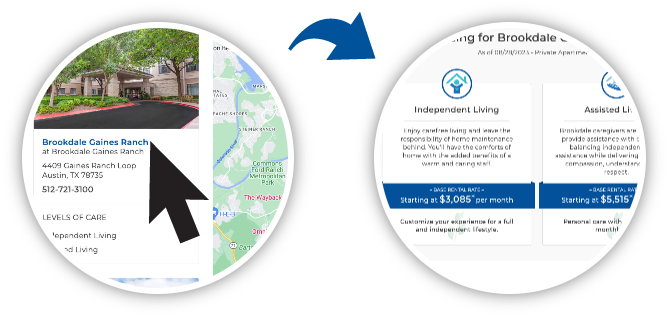- Home
- Brookdale Life
- Brookdale Blogs
- Helpful Things to Know About OTC Hearing Aids
The U.S. Food and Drug Administration (FDA) has issued a new rule to allow for a category of OTC hearing aids, with one of its intentions being to help improve access to the often-expensive devices. In a statement, the FDA called hearing loss a “critical public health issue that affects the ability of millions of Americans to effectively communicate in their daily social interactions.”
Previously, the FDA mandated that any hearing devices be prescribed and fitted by an audiologist as a best practice. The cost of these exams and hearing aids themselves are not covered by Medicare, and prescription devices can run from approximately $1,000-$6,000. For this and other reasons, data suggests that people tend to wait an average of 10 years after they first start noticing hearing loss before seeking treatment.
The new FDA rule creates a category of OTC hearing aids available to adults (individuals who are 18 and over) with mild to moderate hearing loss. Like all OTC products, the hearing aids available over the counter will still be required to meet FDA standards for quality, effectiveness and safety.
“Giving people with mild to moderate hearing loss access to affordable hearing aids is an important step to ensure their health and quality of life,” Nancy LeaMond, AARP’s executive vice president and chief advocacy and engagement officer, said on August 16, the day the FDA made its announcement. LeaMond continued, “[f]or many Americans, the high cost of prescription hearing aids puts them out of reach, increasing their risk of isolation, depression and other health issues. Today’s rule could help millions.” The AARP fought for Congress to push for the rule on behalf of the country’s senior population.
Hearing loss is especially prevalent in older adults, affecting approximately one-third of people ages 65-74, and nearly half of people over 75. Age-related hearing loss has a number of causes, from long-term exposure to loud sounds to other chronic conditions such as high blood pressure and diabetes.
In recent years, Johns Hopkins researchers have contributed to reports that concluded that hearing loss is a modifiable risk factor for cognitive decline and dementia—making it even more crucial for older adults to try to manage this health issue.
The FDA rule takes effect on October 17, 2022, and since some expect that manufacturers likely have products ready to go, consumers may be seeing hearing aids available over-the-counter soon after. Initial estimates are that the OTC devices may cost approximately $300 to $500, and advocates for the change hope marketplace competition will continue to drive prices down.
If you’re experiencing some degree of hearing loss and are not sure if you’re a good candidate for an OTC device, the American Academy of Audiology suggests that you ask yourself these three questions to help determine if your hearing loss falls into the "mild to moderate" category:
1. Can you easily hear during one-on-one conversations?
2. Are there only certain situations where you feel like you would benefit from an OTC hearing aid (as opposed to needing it all the time)?
3. Does slightly increasing the volume on the phone or TV make a difference?
According to the American Academy of Audiology, if your answer to these questions is “yes,” you may be experiencing mild to moderate hearing loss. If you’re unsure about your potential hearing loss, you can make an appointment with an audiologist for a hearing test and then talk through all your options, whether prescription and/or OTC.
The Hearing Loss Association of America has also produced a handy guide for consumers who are considering an OTC hearing aid. The organization suggests asking several questions before you buy, including “is there a trial period or return policy?” and “is it sweat- or water-resistant?”
For information on the potential connection between dementia and hearing loss, check out the webinar here.
The above content is shared for educational and informational purposes only. References to specific products above do not constitute an express or implied endorsement or recommendation by Brookdale with respect to such products. You must consult your doctor before beginning any exercise or fitness program, taking any additional or discontinuing any existing medications, or acting on any content on this website, especially if you have a medical condition. The content is not intended to be a substitute for professional medical advice, diagnosis, or treatment. Never disregard professional medical advice or delay in seeking it because of something you have read on our site.
Categories
- Alzheimer's & Dementia
- Caregiver's Corner
- COVID-19
- Health, Safety and Wellness
- Financial Well-Being
- Passion & Purpose
- The Journey to Senior Living
- Trending Now
- Socialization & Relationships
- Brookdale Solutions
- Brookdale Vision and Growth
Archives
View All
- October 2025
- September 2025
- August 2025
- July 2025
- June 2025
- May 2025
- April 2025
- March 2025
- February 2025
- January 2025
- December 2024
- November 2024
X
Let us help find the right community for you!
Complete the form and a Senior Living Advisor will be in touch!
Inside Brookdale Communities
See what’s happening on our community Instagram pages
Brookdale has communities near you!



